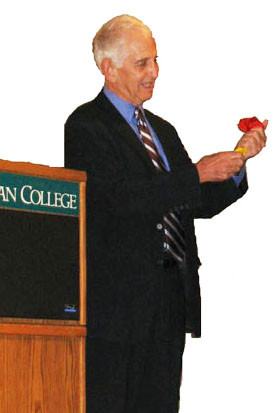An Ellsbergian task for poets

Kaia Sand
Maybe the poets could come up with a better term than ‘whistle-blower?’ That’s what I recall Daniel Ellsberg asking.
It was the spring of 2005 in Walla Walla, Washington, when I had the luxury of a day’s conversations with Daniel Ellsberg, famed for releasing the Pentagon Papers in an effort to end the Vietnam War by revealing how high-level officials were misleading the public. Ellsberg was visiting Jules’s class and giving a lecture at Whitman College, where Jules was employed, and because Jules was employed, he was busy, and I was not so busy, and, thus… I discussed poetry with Ellsberg over green tea. He was an early publisher of Frank O’Hara’s at the Harvard Advocate, he recited lines of poetry from memory, and he urged me to read Robinson Jeffers.
Whistle-blower. If a whistle is blown in a sporting event, someone may have fouled or the half is over or there’s some extra time. But in most instances these offenses are within the bounds of a game, which would be a generous reading of the acts that Ellsberg exposed. War is a game, this metaphor conveys.
I batted around (to continue the sporting metaphor) the idea of finding a new term with some poets, but we never came up with anything else (although I recall Daniel Bouchard suggested employing Ellsberg’s name as a synecdoche). ‘Whistle-blower’ has some things going for it, after all: the image is rich, and appeals to the auditory sense as well.
I’m intrigued by this Ellsbergian task for poets, for those of us who do dwell with words according to soundplay and connotation and rhythm and allusion and connective thinking … how might our care with words circulate?
Take Global Warming. Take Climate Change. Both terms fall short.
The term Global Warming incites furious letters-to-the-editor during snowstorms and other not-hot weather disasters. The term carries with it a need for explanation: a rise in climatic temperature is over the long-term, but what we experience immediately and sensorily is weather, which, as part of the overall phenomenon, is not always hotter, but more chaotic. While "weather is personal experience,” as climatologist Heidi Cullen writes in The Weather of the Future, while climate is a “focus on weather timescales beyond the memory of the atmosphere, which is only about a week” (8). So to speak of a climate heating up is to speak of long-term statistics, not our daily experience of weather.
Climate Change is a term that has been used to describe large-scale shifts in the climate, which include the non-human-caused ice ages etc. Climate Change, as a term for our current and future human-caused predicament is, well, awfully understated, as Republican language strategist Frank Luntz intended it would be. In the same memo in which he suggested Republicans emphasize “scientific uncertainty,” he also wrote “‘Climate change’ is less frightening than ‘global warming.’ ... While global warming has catastrophic connotations attached to it, climate change suggests a more controllable and less emotional challenge” (142).
Climate Disruption is a bit more accurate (& rhythmically pretty nice), but not image-rich. Climate Chaos is alliterative, with nice trochees….
Ideas, poets?
It is with this interest in how poetic images circulate in everyday and activist uses that I am intrigued with the care that Craig Santos Perez developed a metaphor when he addressed the United Nations in 2008 regarding the impact of the military impact of Guam, and how his poetic work infused his activist work, and his activist work, his poetic work.
I will explore that in my next commentary.
works cited
Cullen, Heidi. The Weather of the Future. NY: Harper, 2010.
Luntz, Frank. “The Environment: A Cleaner, Safer, Healthier America.” 2002. Accessed Aug 6, 2011. Environmental Working Group. http://www.ewg.org/project/luntz-memo-environment
Moxie politik